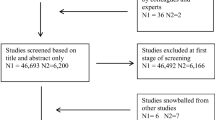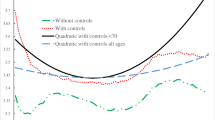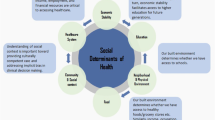Abstract
Education has demonstrated consistent links with many aspects of physical health and is theorized to relate to a variety of behavioral and psychosocial antecedents of health that may ultimately account for these associations. However, many of these associations and the extent to which they manifest specifically for African Americans have not been thoroughly tested. We examined associations of education—distinct from income—with established behavioral and psychosocial antecedents of health in a national sample of African Americans. Education favorably related to many behavioral (e.g., fruit/vegetable intake, lifetime smoking) and psychosocial (e.g., self-efficacy, personality traits, self-esteem, psychological well-being) antecedents of health, but not to all. Some evidence of stronger salutary relations of education for women was found. Results suggest that, for African Americans, education is generally favorably associated with an array of behavioral and psychosocial antecedents of physical health, partially explaining health disparities and providing a point of intervention moving forward.
Similar content being viewed by others
References
Abdullah, A., Doucouliagos, H., & Manning, E. (2015). Does education reduce income inequality? A meta-regression analysis. Journal of Economic Surveys, 29, 301–316.
Adler, N. E., Boyce, T., Chesney, M. A., Cohen, S., Folkman, S., Kahn, R. L., et al. (1994). Socioeconomic status and health: The challenge of the gradient. American Psychologist, 49, 15–24.
Assari, S. (2018a). Health disparities due to diminished return among Black Americans: Public policy solutions. Social Issues and Policy Review, 12, 112–145.
Assari, S. (2018b). Unequal gain of equal resources across racial groups. International Journal of Health Policy and Management, 7, 1.
Assari, S., & Mistry, R. (2018). Educational attainment and smoking status in a national sample of American adults; Evidence for the Black’s diminished return. International Journal of Environmental Research and Public Health, 15, 763. https://doi.org/10.3390/ijerph15040763
Assari, S., Moghani Lankarani, M., Piette, J. D., & Aikens, J. E. (2017a). Socioeconomic status and glycemic control in type 2 diabetes; Race by gender differences. Healthcare, 5, 83.
Assari, S., Nikahd, A., Malekahmadi, M. R., Lankarani, M. M., & Zamanian, H. (2017b). Race by gender group differences in the protective effects of socioeconomic factors against sustained health problems across five domains. Journal of Racial and Ethnic Health Disparities, 4, 884–894.
Assari, S., Preiser, B., & Kelly, M. (2018). Education and income predict future emotional well-being of whites but not blacks: A ten-year cohort. Brain Sciences, 8, 122.
Bauman, A. E., Reis, R. S., Sallis, J. F., Wells, J. C., Loos, R. J., Martin, B. W., et al. (2012). Correlates of physical activity: Why are some people physically active and others not? The Lancet, 380, 258–271.
Block, G., Hartman, A. M., Dresser, C. M., Carroll, M. D., Gannon, J., & Gardner, L. A. (1986). A data-based approach to diet questionnaire design and testing. American Journal of Epidemiology, 124, 453–469.
Braveman, P., Egerter, S., & Williams, D. R. (2011). The social determinants of health: Coming of age. Annual Review of Public Health, 32, 381–398.
Brown, D. S., Thompson, W. W., Zack, M. M., Arnold, S. E., & Barile, J. P. (2015). Associations between health-related quality of life and mortality in older adults. Prevention Science, 16, 21–30.
Brunello, G., Fort, M., Schneeweis, N., & Winter-Ebmer, R. (2016). The causal effect of education on health: What is the role of health behaviors? Health Economics, 25, 314–336.
Case, A., & Deaton, A. (2015). Rising morbidity and mortality in midlife among white non-Hispanic Americans in the 21st century. Proceedings of the National Academy of Sciences, 112, 15078–15083.
Center for Disease Control and Prevention. (2018). https://www.cdc.gov/brfss/index.html Accessed September 8, 2018.
Chen, G., Gully, S. M., & Eden, D. (2001). Validation of a new general self-efficacy scale. Organizational Research Methods, 4, 62–83.
Chen, E., Miller, G. E., Brody, G. H., & Lei, M. (2015). Neighborhood poverty, college attendance, and diverging profiles of substance use and allostatic load in rural African American youth. Clinical Psychological Science, 3, 675–685.
Cohen, S., Mermelstein, R., Kamarck, T., & Hoberman, H. M. (1985). Measuring the functional components of social support. In I. G. Sarason (Ed.), Social support: Theory, research and applications (pp. 73–94). Dordrecht: Springer.
Costa, P. T., Jr., Busch, C. M., Zonderman, A. B., & McCrae, R. R. (1986). Correlations of MMPI factor scales with measures of the five factor model of personality. Journal of Personality Assessment, 50, 640.
Costa, P. T., Jr., & McCrae, R. R. (2004). NEO Personality Inventory—Form S. Lutz: Psychological Assessment Resources, Inc.
Craig, C. L., Marshall, A. L., Sjostrom, M., Bauman, A. E., Booth, M. L., Ainsworth, B. E., et al. (2003). International Physical Activity Questionnaire: 12-country reliability and validity. Medicine and Science in Sports and Exercise, 35, 1381–1395.
Cutler, D. M., & Lleras-Muney, A. (2010). Understanding differences in health behaviour by education. Journal of Health Economics, 29, 1–28.
Czekierda, K., Gancarczyk, A., Park, C. L, & Luszczynska, A. (2018). Meaning in life and physical health: Systematic review and meta-analysis. Psychology & Health Review, 11, 387–418.
Debnam, K. J., Holt, C. L., Clark, E. M., Roth, D. L., Foushee, H. R., Crowther, M., et al. (2012). Spiritual health locus of control and health behaviors in African Americans. American Journal of Health Behavior, 36, 360–372.
Diamond, J. B., & Gomez, K. (2004). African American parents’ educational orientations: The importance of social class and parents’ perceptions of schools. Education and Urban Society, 36, 383–427.
Dinwiddie, G. Y., Zambrana, R. E., Doamekpor, L. A., & Lopez, L. (2016). The impact of educational attainment on observed race/ethnic disparities in inflammatory risk in the 2001–2008 National Health and Nutrition Examination Survey. International Journal of Environmental Resources and Public Health, 13, 42.
Documet, P., Bear, T. M., Flatt, J. D., Macia, L., Trauth, J., & Ricci, E. M. (2015). The association of social support and education with breast and cervical cancer screening. Health Education & Behavior, 42, 55–64.
Fuller-Rowell, T. E., Curtis, D. S., Doan, S. N., & Coe, C. L. (2015). Racial disparities in the health benefits of educational attainment: A study of inflammatory trajectories among African American and white adults. Psychosomatic Medicine, 77, 33–40.
Gaydosh, L., Schorpp, K. M., Chen, E., Miller, G. E., & Harris, K. M. (2018). College completion predicts lower depression but higher metabolic syndrome among disadvantaged minorities in young adulthood. Proceedings of the National Academy of Sciences, 115, 109–114.
Gilbert, D. J., Harvey, A. R., & Belgrave, F. Z. (2009). Advancing the Africentric paradigm shift discourse: Building towards evidence-based Africentric interventions in social work practice with African Americans. Social Work, 54, 243–252.
González, M. G., Swanson, D. P., Lynch, M., & Williams, G. C. (2016). Testing satisfaction of basic psychological needs as a mediator of the relationship between socioeconomic status and physical and mental health. Journal of Health Psychology, 21, 972–982.
Hahn, R. A., & Truman, B. I. (2015). Education improves public health and promotes health equity. International Journal of Health Services, 45, 657–678.
Hampson, S. E., Edmonds, G. W., Barckley, M., Goldberg, L. R., Dubanoski, J. P., & Hillier, T. A. (2016). A Big Five approach to self-regulation: Personality traits and health trajectories in the Hawaii longitudinal study of personality and health. Psychology, Health & Medicine, 21, 152–162.
Haught, H. M., Rose, J. P., & Brown, J. A. (2016). Social-class indicators differentially predict engagement in prevention vs. detection behaviors. Psychology & Health, 31, 21–39.
Hiza, H. A., Casavale, K. O., Guenther, P. M., & Davis, C. A. (2013). Diet quality of Americans differs by age, sex, race/ethnicity, income, and education level. Journal of the Academy of Nutrition and Dietetics, 113, 297–306.
Holt, C. L., Clark, E. M., Kreuter, M. W., & Rubio, D. M. (2003). Spiritual health locus of control and breast cancer beliefs among urban African American women. Health Psychology, 22, 294–299.
Holt, C. L., Clark, E. M., Roth, D. L., Crowther, M., Cohler, C., Fouad, M., et al. (2009). Development and validation of instruments to assess potential religion-health mechanisms in an African American population. Journal of Black Psychology, 35, 271–288.
Holt, C. L., Clark, E. M., Roth, D. L., Crowther, M., Kohler, C., Fouad, M., et al. (2010). Development and validation of an instrument to assess perceived social influence on health behaviors. Journal of Health Psychology, 15, 1225–1235.
Hudson, D. L., Neighbors, H. W., Geronimus, A. T., & Jackson, J. S. (2016). Racial discrimination, John Henryism, and depression among African Americans. Journal of Black Psychology, 42, 221–243.
Ivcevic, Z., & Brackett, M. (2014). Predicting school success: Comparing conscientiousness, grit, and emotion regulation ability. Journal of Research in Personality, 52, 29–36.
Johnson-Lawrence, V., Zajacova, A., & Sneed, R. (2017). Education, race/ethnicity, and multimorbidity among adults aged 30–64 in the National Health Interview Survey. SSM-Population Health, 3, 366–372.
Kaplan, R. M., Fang, Z., & Kirby, J. (2017). Educational attainment and health outcomes: Data from the Medical Expenditures Panel Survey. Health Psychology, 36, 598–608.
Keedy, N. H., Keffala, V. J., Altmaier, E. M., & Chen, J. J. (2014). Health locus of control and self-efficacy predict back pain rehabilitation outcomes. The Iowa Orthopaedic Journal, 34, 158–165.
Kelley-Moore, J. A., & Ferraro, K. F. (2004). The black/white disability gap: Persistent inequality in later life? The Journals of Gerontology Series B: Psychological Sciences and Social Sciences, 59, S34–S43.
Krause, N. (2004). Stressors arising in highly valued roles, meaning in life, and the physical health status of older adults. The Journals of Gerontology Series B: Psychological Sciences and Social Sciences, 59(5), S287–S297.
Krause, N. (2018). Assessing the relationships among stress, God-mediated control, and psychological distress/well-being: Does the level of education matter? The Journal of Social Psychology. https://doi.org/10.1080/00224545.2018.1431604.
Kreuter, M. W., Skinner, C. S., Holt, C. L., Clark, E. M., Haire-Joshu, D., Fu, Q., et al. (2005). Cultural tailoring for mammography and fruit and vegetable consumption among low-income African American women in urban public health centers. Preventive Medicine, 41, 53–62.
Lawrence, E. M. (2017). Why do college graduates behave more healthfully than those who are less educated? Journal of Health and Social Behavior, 58, 291–306.
Makambi, K. H., Williams, C. D., Taylor, T. R., Rosenberg, L., & Adams-Campbell, L. L. (2009). An assessment of the CES-D scale factor structure in black women: The Black Women’s Health Study. Psychiatry Research, 168, 163–170.
McCarthy, J. D., & Hoge, D. R. (1982). Analysis of age effects in longitudinal studies of adolescent self-esteem. Developmental Psychology, 18, 372–379.
Merkin, S. S., Karlamangla, A., Crimmins, E., Charette, S. L., Hayward, M., Kim, J. K., et al. (2009). Education differentials by race and ethnicity in the diagnosis and management of hypercholesterolemia: A national sample of US adults (NHANES 1999–2002). International Journal of Public Health, 54, 166–174.
Miller, G. E., Cohen, S., Janicki-Deverts, D., Brody, G. H., & Chen, E. (2016). Viral challenge reveals further evidence of skin-deep resilience in African Americans from disadvantaged backgrounds. Health Psychology, 35, 1225–1234.
Mirowsky, J., & Ross, C. E. (2003). Education, social status, and health. Hawthorne, NY: Aldine de Gruyter.
Mulder, B. C., de Bruin, M., Schreurs, H., van Ameijden, E. J., & van Woerkum, C. M. (2011). Stressors and resources mediate the association of socioeconomic position with health behaviours. BMC Public Health, 11, 798.
Murray, A. L., & Booth, T. (2015). Personality and physical health. Current Opinion in Psychology, 5, 50–55.
O’Keefe, J. H., Bhatti, S. K., Bajwa, A., DiNicolantonio, J. J., & Lavie, C. J. (2014). Alcohol and cardiovascular health: The dose makes the poison… or the remedy. Mayo Clinic Proceedings, 89, 382–393.
O’Leary, A. O., Jemmott, J. B., III, Stevens, R., Rutledge, S. E., & Icard, L. D. (2014). Optimism and education buffer the effects of syndemic conditions on HIV status among African American men who have sex with men. AIDS Behavior, 18, 2080–2088.
OBSSR. (2014). Education and health: New frontiers. Meeting summary. https://obssr.od.nih.gov/wp-content/uploads/2016/07/OBSSR_Education_and_Health_REV_8-22-2014_FINAL_RLA.pdf. Accessed July 26, 2018.
Olshansky, S. J., Antonucci, T., Berkman, L., Binstock, R. H., Boersch-Supan, A., Cacioppo, J. T., et al. (2012). Differences in life expectancy due to race and educational differences are widening, and many may not catch up. Health Affairs, 31, 1803–1813.
Pampel, F. C., Krueger, P. M., & Denney, J. T. (2010). Socioeconomic disparities in health behaviors. Annual Review of Sociology, 36, 349–370.
Parks, S. E., Housemann, R. A., & Brownson, R. C. (2003). Differential correlates of physical activity in urban and rural adults of various socioeconomic backgrounds in the United States. Journal of Epidemiology and Community Health, 57, 29–35.
Piedmont, R. L., & Weinstein, H. P. (1994). Predicting supervisor ratings of job performance using the NEO Personality Inventory. Journal of Psychology, 128, 255–265.
Radloff, L. S. (1977). The CES-D scale: A self-report depression scale for research in the general population. Applied Psychological Measurement, 1, 385–401.
Rosenberg, M. (1965). Society and the adolescent self-image. Princeton, NJ: Princeton University.
Roth, D. L., Ackerman, M. L., Okonkwo, O. C., & Burgio, L. D. (2008). The four-factor model of depressive symptoms in dementia caregivers: A structural equation model of ethnic differences. Psychology and Aging, 23, 567–576.
Ruiz, J. M., Steffen, P., & Prather, C. C. (2012). Socioeconomic status and health. In A. Baum, T. A. Revenson, & J. E. Singer (Eds.), Handbook of health psychology. Mahwah, NJ: Lawrence Erlbaum Associates.
Seeman, T., Merkin, S. S., Crimmins, E., Koretz, B., Charette, S., & Karlamangla, A. (2008). Education, income and ethnic differences in cumulative biological risk profiles in a national sample of US adults: NHANES III (1988–1994). Social Science and Medicine, 66, 72–87.
Signorello, L. B., Cohen, S. S., Williams, D. R., Munro, H. M., Hargreaves, M. K., & Blot, W. J. (2014). Socioeconomic status, race, and mortality: A prospective cohort study. American Journal of Public Health, 104, e98–e107.
Sin, N. L., Yaffe, K., & Whooley, M. A. (2015). Depressive symptoms, cardiovascular disease severity, and functional status in older adults with coronary heart disease: The heart and soul study. Journal of the American Geriatrics Society, 63, 8–15.
Smith, S. G., McGregor, L. M., Raine, R., Wardle, J., Wagner, C., & Robb, K. A. (2016). Inequalities in cancer screening participation: Examining differences in perceived benefits and barriers. Psycho-Oncology, 25, 1168–1174.
Stein, A. D., Lederman, R. I., & Shea, S. (1993). The Behavioral Risk Factor Surveillance System questionnaire: Its reliability in a statewide sample. American Journal of Public Health, 83, 1768–1772.
Strand, B. H., Grøholt, E. K., Steingrímsdóttir, Ó. A., Blakely, T., Graff-Iversen, S., & Næss, Ø. (2010). Educational inequalities in mortality over four decades in Norway. BMJ, 340, c654.
Thornton, R. L., Glover, C. M., Cené, C. W., Glik, D. C., Henderson, J. A., & Williams, D. R. (2016). Evaluating strategies for reducing health disparities by addressing the social determinants of health. Health Affairs, 35, 1416–1423.
US Census Bureau. (2011). 2011 American Community Survey 1-year estimates. Retrieved from https://factfinder.census.gov/faces/nav/jsf/pages/index.xhtml. Accessed 5/8/2018.
Viner, R. M., Hargreaves, D. S., Ward, J., Bonell, C., Mokdad, A. H., & Patton, G. (2017). The health benefits of secondary education in adolescents and young adults. SSM-Population Health, 3, 162–171.
Watson, D., Clark, L. A., & Tellegen, A. (1988). Development and validation of brief measures of positive and negative affect: The PANAS scales. Journal of Personality and Social Psychology, 54, 1063–1070.
Williams, J. S., Lynch, C. P., Voronca, D., & Egede, L. E. (2016). Health locus of control and cardiovascular risk factors in veterans with type 2 diabetes. Endocrine, 51, 83–90.
Yen, I. H., & Moss, N. (1999). Unbundling education: A critical discussion of what education confers and how it lowers risk for disease and death. Annals of the New York Academy of Sciences, 896, 350–351.
Zajacova, A., & Lawrence, E. M. (2018). The relationship between education and health: Reducing disparities through a contextual approach. Annual Review of Public Health, 39, 273–289.
Zou, H., Tian, Q., Chen, Y., Cheng, C., & Fan, X. (2017). Coping styles mediate the relationship between self-esteem, health locus of control, and health-promoting behavior in Chinese patients with coronary heart disease. Journal of Cardiovascular Nursing, 32, 331–338.
Funding
This study was funded by a grant from the National Cancer Institute, (#1 R01 CA 105202). The study was approved by the University of Maryland Institutional Review Board (#373528-1).
Author information
Authors and Affiliations
Corresponding author
Ethics declarations
Conflict of interest
Crystal L. Park, Eddie M. Clark, Emily Schulz, Beverly Rosa Williams, Randi M. Williams, and Cheryl L. Holt declare that they have no conflict of interest.
Human and animal rights and Informed consent
All procedures performed were in accordance with the ethical standards of the institutional and/or national research committee and with the 1964 Helsinki declaration and its later amendments or comparable ethical standards. Informed consent was obtained from all individual participants included in the study.
Additional information
Publisher's Note
Springer Nature remains neutral with regard to jurisdictional claims in published maps and institutional affiliations.
Rights and permissions
About this article
Cite this article
Park, C.L., Clark, E.M., Schulz, E. et al. Unique contribution of education to behavioral and psychosocial antecedents of health in a national sample of African Americans. J Behav Med 42, 860–872 (2019). https://doi.org/10.1007/s10865-018-00009-w
Received:
Accepted:
Published:
Issue Date:
DOI: https://doi.org/10.1007/s10865-018-00009-w




